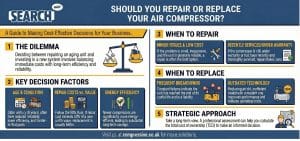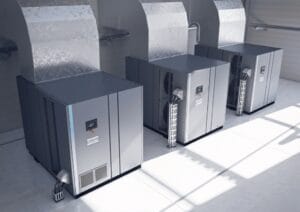Should you repair or replace your air compressor?
Air compressors are a major investment and vital to your business, powering operations and processes. Part of their benefits are their long operational lives, but that can make it challenging to determine the best time to replace them.
So, how do you know when it is time to replace, rather than repair, your air compressor?
We work with compressed air systems that are enjoying a long and productive life, as well as helping businesses replace compressors that are not performing well. This enables us to offer expert insight on that decision.
Why the replacement decision matters
As compressors age, their performance, even with top-quality maintenance, degrades. Wear and tear can cause more frequent downtime and lost productivity, leading to increased repair costs or struggles to keep up with business growth.
Even if your compressor is not showing signs of reduced performance, newer models may offer compliance and energy savings that make compressor replacement a cost-effective option.

Knowing when to repair or replace an air compressor can reduce costs improve efficiency and avoid downtime
What affects compressor lifespan
Compressors are designed to work hard and have a long lifespan. However, many factors affect how long that life will be.
Usage is a direct determinant. A compressor that is only in use for a few hours a week can be expected to last significantly longer than the same compressor model used for several hours a day, every day.
Drive type will influence lifespan. A variable-speed rotary screw compressor adapts to demand, resulting in less wear and tear when demand drops. Fixed-speed drives, however, constantly operate to meet peak demand, and that takes a toll.
The environment is perhaps the most significant determinant. Intake air quality, ambient temperature, and the nature of the work around the compressor all have an impact, changing how hard the compressor works and the risks it faces from external damage.
We would also highlight the importance of maintenance. Although it will not change how hard or where your compressor operates, it can help deal with those factors, ensuring that the stresses of low-quality air intake or constant running cause as little harm to the compressor as possible.

Should you repair or replace your air compressor?
When you shouldn’t consider replacement
In many situations, replacement is simply not necessary. Factors that would suggest you opt for repair, rather than replacement, include:
- Having a relatively new compressor: if your compressor’s age is still in single digits, it should still comply with regulations and be efficient enough that repair is the best option. A good guideline is to check if it is still in warranty.
- The issue is minor: many repairs are quick, simple, and cheap. For example, a valve swap would not necessitate full system replacement.
- You have no problem meeting your air demands: we usually recommend some headroom in your compressor, even before considering growth plans. If your compressor still powers all you need, then why change it?
- Your compressor has a good operational history: if your compressor has good reliability, the occasional repair should not be a cause for concern.
- You can still source spares and replacements easily: the longevity of compressors, combined with the standardisation of parts by – and even between – manufacturers, means that obtaining spares is rarely an issue. If you are struggling, though, it can be a sign that your compressor is reaching the end of its serviceable life.
Signs it is time to replace your air compressor
If your compressor does not meet all these criteria, you may want to consider a new one. Other factors that might point towards a replacement include:
- High energy costs: older compressors are less efficient than current models. At a time of rising energy prices, the difference in efficiency may make replacement cost-effective, especially with heat recovery, reducing your return-on-investment time.
- Compliance or safety issues: if you are finding it challenging to maintain regulatory compliance, the easiest solution might be replacement. If you are unable to comply with regulations or maintain safety, you will have no choice.
- Failure to meet air demand: air compressors are incredibly hardworking, but they cannot do more than they were designed for. If your demand for air has increased beyond your compressor’s capacity, a replacement is the simple solution.
Calculating whether to repair or replace
If you already have a compressor in place, it is possible to calculate whether purchasing a new one is worthwhile.
If the cost of repair approaches or exceeds 50% of the replacement cost, it is typically a good indication that replacement is necessary. However, you need to consider the lifetime cost of your compressor.
You can use data, such as the air demand from your current compressor, to calculate the cost of a more energy-efficient replacement. We can also advise on the likely ongoing repair costs of your current compressor compared to the servicing options available for a newer model.
You should also include an estimate of the additional costs or losses caused by your compressor. If you are experiencing frequent downtime, your calculation should include the impact of this.
The picture that typically emerges is of increasing costs and lost productivity with your current compressor, against a more efficient compressor that will gradually recoup the initial investment. The ideal time to upgrade is the point where you minimise your total costs.
You should also trust your business sense. If you have started to ask whether it is the right time to replace your compressor, the question should not be ‘if,’ but ‘when.’
Get expert advice
At Search Air, we take pride in maximising the performance of every compressor we work with. But we also know that, sometimes, replacement is the best option.
Our knowledge and experience can help you with that decision, offering an honest opinion on both the costs and benefits of either option, so you can make a fully informed decision on if, and when, replacement is the best choice.
We also offer a range of inclusive servicing plans, so whether you opt for a new system or stick with your current compressor, you can be confident it is in the best possible hands with our engineers. Contact us today.

